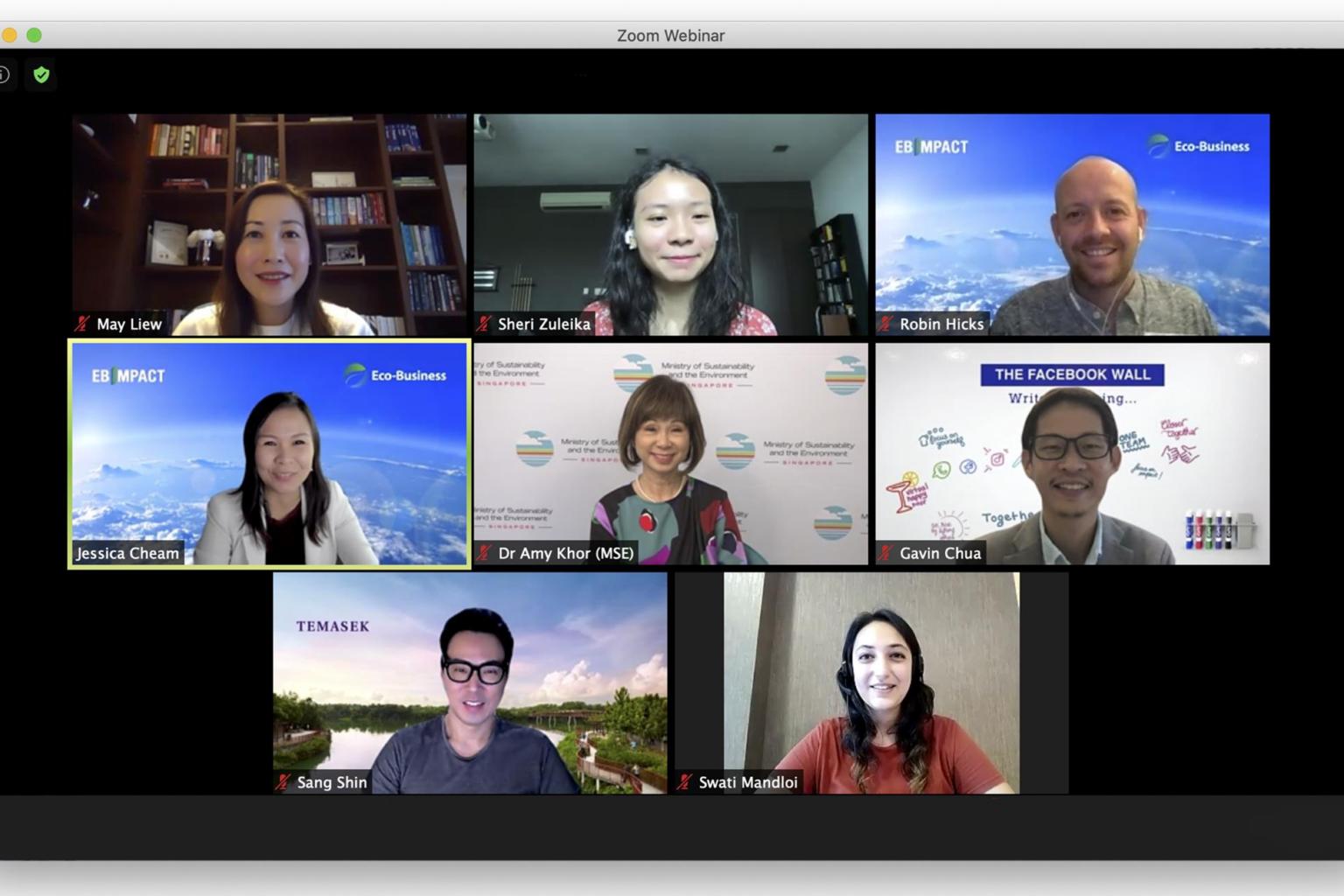Singapore youth to take the lead in sustainability innovations
Sign up now: Get ST's newsletters delivered to your inbox

The dialogue included Dr Amy Khor, Senior Minister of State for Sustainability and the Environment, students, climate activists and professionals from Temasek, Facebook and SP Group.
PHOTO: EB IMPACT/FACEBOOK
SINGAPORE - Singapore wants its young people to come up with innovative solutions to encourage sustainability in companies and the community.
Media outlet Eco-Business's non-profit arm EB Impact came up with a mentorship programme where small groups of youngsters will help to solve environmental issues for companies, under the guidance of professionals in the green sector.
This programme - which has seen 63 young people and 52 mentors signing up so far since mid-October - was officially launched at a virtual dialogue on Friday (Nov 20).
The dialogue included Dr Amy Khor, Senior Minister of State for Sustainability and the Environment, students, climate activists and professionals from Temasek, Facebook and SP Group.
The mentorship programme, called Sustainability Exchange, also opened up a second round of applications on Friday on the EB Impact website, which will close on Dec 11.
Applicants must be aged between 19 and 30, and they should be passionate about sustainability issues and have shown some activism in green causes. Mentors who sign up should have at least five years of experience in a green-related field.
Each mentor will be matched with three to four young people based on their interests. The three-month mentorship will start on Jan 11 and end in April. At the end of the programme, the participants have to submit a written report explaining their solutions. In September next year and some time in 2022, EB Impact will follow up with the groups on the success and efficacy of their initiatives.
The programme is held in partnership with Facebook and supported by Climate Action SG Alliance.
During the dialogue, Dr Khor highlighted four environmental priorities that she hopes young people will act upon: coming up with zero-waste strategies to help achieve the country's aim of sending a third less waste into Semakau Landfill by 2030, research into technologies for converting waste into useful products, climate science, and ways to protect the coast against a rise in the sea level.
Dr Khor also stressed that young people should understand the "intricacies, the considerations and the trade offs that are often required when incorporating sustainability in policies and business decisions".
She added: "This will enable them to effectively lead the charge against climate change."
Dr Khor also recognised that eco-anxiety - a chronic fear of environmental doom - is growing among young people, but there are opportunities and green career paths to convert those worries into action.
One professional who has signed up to be a mentor in the programme is Ms May Liew, electricity and gas provider SP Group's head of sustainability and open innovation.
Ms Liew hopes that the young mentees will help the group raise awareness about energy consumption and encourage customers to use its app to calculate their personal carbon footprint.
SP Group has recently released a feature on its app that allows customers to buy green credits and support renewable energy projects. Ms Liew said she also hopes to hear from her youth group on ways to market this initiative.
Ms Sheri Zuleika, an undergraduate at Singapore Management University (SMU), who signed up for the programme, is no stranger to green solutions.
The 22-year-old and two friends from SMU and the National University of Singapore's Institute of Systems Science recently joined a competition where they proposed ways to reduce food and general waste on Singapore Airlines flights.
To ensure that the airline still makes money from sustainable decisions, they suggested it could sell the energy from digested food waste.
The North West Community Development Council (CDC) is also calling for more young people and students from the district to propose sustainable ideas. Last year, the CDC announced a fund of $300,000 that can be used to support ground-up environmental projects, among others. This is part of the North West Sustainability Plan 2030.
Recently, students from Northland Secondary School made use of another environmental fund from the CDC to address the problem of bruised fruit and vegetables going to waste. The students used the blemished produce left on supermarket shelves to cook meals and help people realise that "ugly food" is still edible.


